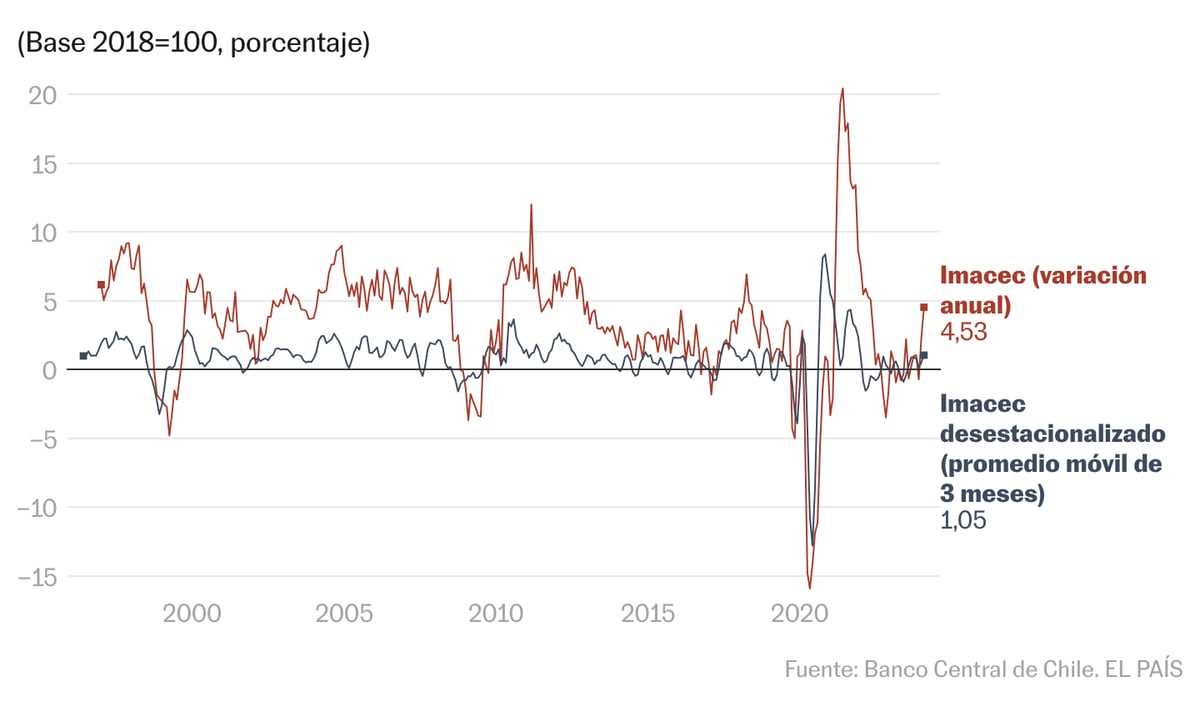The rebound in economic growth that Europe was expecting has been stopped short by the new wave of infections.
That will delay the recovery of activity levels prior to the pandemic until at least the end of 2022. And only for half of the countries in the euro zone, since the forecasts published this Thursday by Brussels confirm a crisis at double speed: Spain This year it will suffer the worst drop in the entire EU, with a 12.4% drop in GDP, as advanced by EL PAÍS.
In parallel, each revision confirms Germany's ability to better cope with the recession, with a contraction of 5.6%.
En español
Brussels lowers growth forecast for Spain but projects strong rebound
The European Commission has released its third forecasts since the Covid-19 pandemic broke out last March, causing the “deepest recession in the history of the EU”, in the words of Commissioner Paolo Gentiloni.
The EU was facing a recovery process from July.
“The rebound has been interrupted.
Growth will stop in the fourth quarter, but it will pick up again in the first quarter of 2021 ”, warned the European Commissioner for the Economy.
The strong recovery in Europe during the summer hiatus has led the Commission to improve its forecast for this year.
In July, Brussels predicted a drop in GDP in the euro zone as a whole of 8.1%, followed by growth of 6.1% by 2021. Now it believes that this year the economy of the countries of the single currency will contract 7.8%, but that the second wave in Europe will lead to weaker growth next year and, in part, postponed to 2022. Therefore, it foresees an economic expansion of 4.2% by 2021 and 3% in 2022.
This year's improvement is mainly due to the strength of Germany.
If a drop of 6.3% was already expected in the summer, now an equally historic but more modest fall is being considered, of 5.6% in 2020. “That is less than the average for the euro zone and less than previously projected .
Beyond the recovery in consumption, industry and exports will drive growth in 2021 and 2022, ”Gentiloni said.
Brussels also foresees a notable improvement for the Netherlands - from a drop of 6.8% to 5.3% -, but also for Italy - from sinking 11.2% to 9.9% - and for France - which would go from a fall in GDP of 10.6% to 9.4% -.
That leaves Spain as the country where the disaster will be the greatest: a huge 12.4%.
Spain believes that these forecasts are out of date because they do not include a third quarter in which the country grew more than expected, both in terms of GDP and employment.
In addition, the report admits that it could not capture the impact of the recovery plan measures, which could boost 2021 growth by 2.5 percentage points.
However, Gentiloni said that the bad Spanish data is due rather to the fact that the second wave of infections began earlier in Spain - which in summer was already vetoed by many countries as a holiday destination for its citizens - and because of its economic structure, depending on of the tourism sector.
Brussels also predicts that Spain will close this year with an unemployment rate of 16.7%, but that it will climb to 17.9% next year and will drop to 17.3% in 2022, when it will be the highest of the entire EU, ahead of Greece, Italy and France.
This is due to the gradual withdrawal of measures to sustain the economy, especially ERTE, which according to the Commission's report "have done a lot to contain the loss of employment, although they have not been able to avoid it entirely."
Similarly, Brussels points out that Spain will be the country that will suffer the greatest deterioration in public finances.
The deficit will skyrocket to 12.2% of GDP and drop to 8.6% in 2022, above Italy, France, Greece or Portugal.
Therefore, Gentiloni encouraged Spain to ask for the entire recovery plan package.
That is, the 140,000 million in grants and loans, and not just non-refundable transfers.
"This decision is not made in Brussels and I fully respect the decisions of the member countries," added the commissioner.
Germany and Poland recover faster
In any case, the auguries from Brussels are confirmed.
The crisis will occur at two speeds.
If its forecasts are met, Spain will be the only country to fall at a double-digit rate this year.
Gentiloni stressed that next year and in 2022 it will grow at a faster rate than the euro zone as a whole.
But it will be insufficient to recover everything lost from before the crisis.
That is, to follow the path of economies such as Germany or Poland (outside the euro zone), the only countries that will achieve that their economy is even larger than before the start of the pandemic.
Other countries will come closer to rebuilding their economies in the next two years. But half of the partners will not succeed. “These divergences reflect the difference between the severity of the pandemic and the rigor of the containment measures linked to it. But they also reflect differences in their domestic policy responses and in economic structures. Countries with a larger tourism sector are expected to take longer to achieve full recovery, ”added the commissioner. Specifically, the Commission report indicates that at the end of 2022 Spain's GDP is still 3% lower than it was before the pandemic began.

/cloudfront-eu-central-1.images.arcpublishing.com/prisa/TT77H4WGHRNDEKRXZSI7D2HOCI.jpg)
/cloudfront-eu-central-1.images.arcpublishing.com/prisa/BSW76ADTMZBGXEN5B5THLU2R7M.jpg)



/cloudfront-eu-central-1.images.arcpublishing.com/prisa/RIEGNR2BRDHJGVEUXQK5ZTXPMI.jpg)
/cloudfront-eu-central-1.images.arcpublishing.com/prisa/JVLB4BGCGKEAEERWV6XUTKFN2U.jpg)
/cloudfront-eu-central-1.images.arcpublishing.com/prisa/TJIZLZ7VXOV4MBYNPTH2DNQ7CI.jpg)
/cloudfront-eu-central-1.images.arcpublishing.com/prisa/R5YJ3MNWQRCGTFO4MKHLQKANJI.jpg)